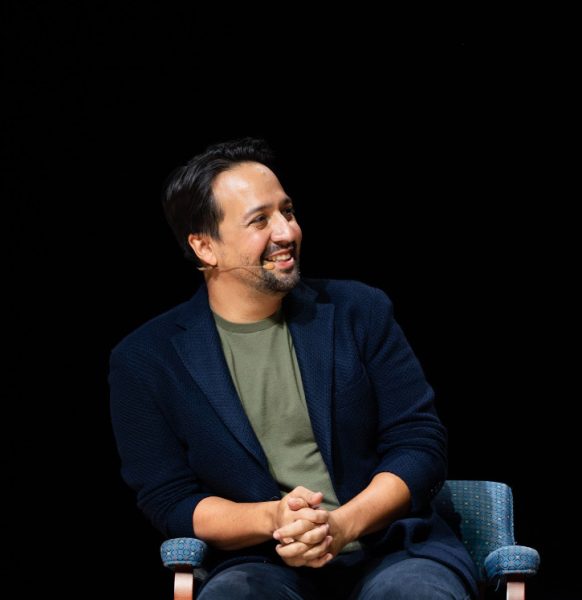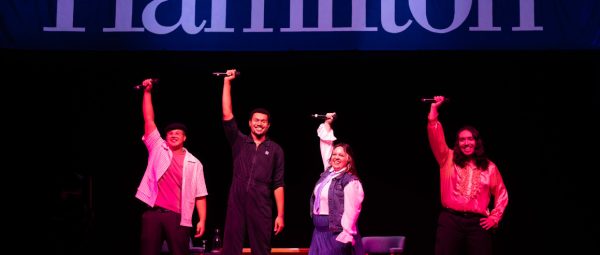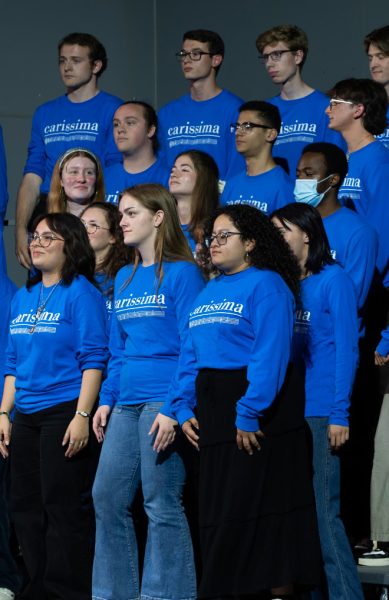
In 2012, multi-hyphenate songwriter and actor Lin-Manuel Miranda performed the opening number from his then-upcoming musical Hamilton at Hamilton College in celebration of the school’s bicentennial. Three years later, the musical opened on Broadway, earning the Pulitzer Prize and eleven Tonys, including Best Book and Score of a Musical. To say that the musical was critical and commercial success is an understatement. It served as the soundtrack to the latter half of the 2010s, converting even musical theatre nonbelievers and outsiders, as well as a generation of schoolchildren. The musical’s popularity among the general public—the extent to which it permeated popular and internet culture—was unprecedented. On Monday evening, ten years after Hamilton’s Broadway début, Miranda returned to campus as this year’s Sacerdote Great Names speaker. Hamilton alum Eric Kuhn ’09—himself an award-winning Broadway producer—interviewed Miranda before an audience comprised of students, faculty and members of the surrounding community.
Miranda is an animated speaker, punctuating his responses with gestures, reenactions, and puckish asides to the audience. At one memorable point, he leapt to his feet and rapped part of “My Shot,” inviting the audience—many of whom were swept up by the Hamilton craze in elementary and middle school—to join in. Hamilton students came away from the event exhilarated and inspired. “I think Lin is an embodiment of a liberal arts education,” comments Dehler Ingham ’27. “He’s got authenticity. He’s got ambition. He’s got creativity. And it’s all mixed together in a personality that takes a lot of pride in his craft. And I think one of the quotes that really resonated with me the most was just — paraphrasing this but—just ‘get lost in the work you do.’” Philip Wohlfeld ’28 says, “I think it’s a great addition to the Great Names Series. I think he brings a nice take from someone who knows what it’s like to get their shot and not waste it. And so I think that it’s a good addition, especially for a lot of students who are studying the creative arts.”
Hamilton recounts the formation of our country as intertwined with the making of a man. As a character, Alexander Hamilton (originally played by Miranda) furnishes the as-of-yet unformed America with a voice and a personality. “Ayo, I’m just like my country/I’m young, scrappy and hungry,” he raps in “My Shot.” The musical makes it abundantly clear that Alexander Hamilton embodies the spirit of the nation: he was an immigrant, a “self-starter” who rose from nothing to become one of the most powerful statesmen in the young nation, who shaped the foundation and evolution of the country. Miranda wrote “My Shot,” Alexander’s vehement, brazen self-introduction, over the course of a year. On the other hand, the rousing yet poignant “Wait for It,” originally sung by vocal powerhouse Leslie Odom Jr. in the role of Aaron Burr, was written in a single evening. Inspiration descended on Miranda as he was taking the A train to a friend’s birthday party. He dropped by the party briefly before rushing out to finish the song, which he completed on the train ride back home. Overall, the musical took between six and seven years to write. During the interview, Miranda advised aspiring writers to embrace rewriting. Shaping an effective musical—or a nation—requires editing.
Ron Chernow’s expansive biography of Alexander Hamilton planted the idea for the musical in Miranda’s mind. As Miranda read the chronicle during a 2008 vacation, he started to imagine Alexander Hamilton, George Washington and other illustrious historical figures of the era as hiphop emcees. In an August interview, he asked, “Because what are our favorite hip-hop MCs, if not chroniclers of their own struggle and their own surroundings?” The Hamilton soundtrack features abundant internal rhymes and turbo-charged rap verses, mirroring the rapid pace and explosive energy of America’s progression towards independence in the 1770s. The musical constructs Alexander Hamilton as a hip-hop-esque personification of the nation, full of swagger, audacity and boundless ambition. For the most part, Hamilton is written in the idiom of the modern day—allusions to hip hop tracks abound—interspersed with snippets from contemporary historical documents, including Alexander Hamilton’s magnum opus, The Federalist Papers, his scandalous admission of his affair, The Reynolds Pamphlet, George Washington’s farewell address and additional correspondences. It recounts the long-ago history of America’s founding while recalling a more recent historical moment, operating across multiple registers of authenticity.
Hamilton both tapped into and defined the zeitgeist of the Obama era. It’s a story of ascendence and upwards mobility, of striving; it elevates and extols America’s history while freighting the narrative with a sociopolitical consciousness. Miranda has garnered criticism for presenting an idealized view of America’s founding, but, as Miranda remarked in the interview, Hamilton conveys the perpetual messiness and uncertainty inherent in building a country. In “The Room Where It Happens,” the cast sings, “We want our leaders to save the day—/But we don’t get a say in what they trade away/We dream of a brand new start—/But we dream in the dark for the most part.”
The majority of the interview concentrated on Miranda’s most well-known (not to mention highest-grossing) musical, but Miranda also discussed his other projects — the 2008 musical In the Heights, Disney films Moana and Encanto, for which Miranda wrote the soundtracks, and the musical film Tick, Tick . . . Boom!, which he directed. Miranda wrote the draft for In the Heights in 1999 as a sophomore at Wesleyan University; it opened on Broadway in 2008, initiating Miranda’s meteoric ascent to fame. After Hamilton made Miranda a household name (I have a Christmas ornament shaped like his face), Disney brought him onboard to bestow Moana and Encanto with a now characteristic and eminently recognizable sound, infused with verve and brio. Miranda leapt at the chance to write a multigenerational family saga for Encanto. As a Puerto Rican-American, Miranda’s experiences are mirrored by the film; as a child, relatives flowed in and out of his family home.
All of Miranda’s projects are imbued with a great sincerity and a freewheeling buoyancy. He’s stylistically flexible, drawing from a multiplicity of sources so as to mirror the rhythm and tone of modern life in his music. Currently, sincerity is frequently perceived as passé; optimism as dated; enthusiasm as pointless. But, judging by the mood of the auditorium Monday night, Miranda’s signature style remains not just appreciated, but beloved.


